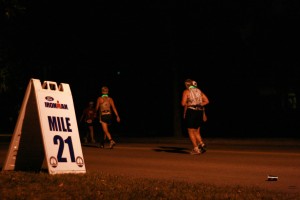Run:Walk Athletes: How Fast Do You Walk?
 If you’re a run:walk athlete, do you know how fast you walk?
If you’re a run:walk athlete, do you know how fast you walk?
A lot of run:walk marathoners with whom I train do NOT know how fast they walk.
Some don’t seem to care, and it’s evident in just how much they slow down in the walking phase of the run:walk method.
Others care, but they don’t know.
Given that you’re still reading, I assume that you care to know and need some motivation to figure it out.
In my opinion, the best way to figure out how fast you walk is the simplest.
I completed a 21-miler last Saturday in preparation for several upcoming races — a 10K, some half marathons, and at least two marathons in the next few months.
One of my marathon training and racing partners, whose name is Olga, started the 21-miler with me, and we stayed together for the first seventeen miles.
Then, her running pace picked up ever so slightly but enough to cause me to become winded by trying to keep up with her after that. (Olga and I are matched well at the marathon distance, but her pace at seventeen miles was not a good match for my pace. These variations in pacing are a topic for another time, but they certainly reinforce the advice to “Run your own race!”)
I told Olga to keep running without me, as I slowed to a walk to catch my breath.
With no training partner for those final four miles, I committed myself to walking as much of the remainder as necessary before I felt that I could go back to the run:walk method.
I turned on my step beeper, adjusted it to a spry but aerobic (“breatheable”) walking cadence for me (138 steps per minute), and walked … and walked … and walked.
By the 20-mile mark (per my GPS wrist unit), I was ready to switch back to the run:walk method for the final mile, and I had covered three miles with an average pace in each mile of about 14:30/mile.
This illustrates the simplest way to figure out how fast you can walk in the walking phase of the run:walk method: Walk at least one full mile, ideally with a step beeper to keep you focused on your cadence.
So, WHY should you care about your walking pace and what it is?
- This can help you to set your step beeper to the best walking cadence for you.
- The smaller your run:walk ratio (e.g., 3:1 instead of 10:1), the more important your walking pace is to your race duration.
- You need to know your walking pace when using Run:Walk Pace Tables in Minutes/Mile or Run:Walk Pace Tables in Minutes/Kilometer to look up your race duration based on the race distance (any of 20 race distances from a 3K to a 50K), your run:walk ratio (anywhere from 10:1 to 1:1), and your running pace (anywhere from 6:00/mile to 13:30/mile, or from 3:45/kilometer to 8:00/kilometer).
What has been your experience with measuring how fast YOU walk? Were you surprised? Why? Please leave a comment here. Thanks!